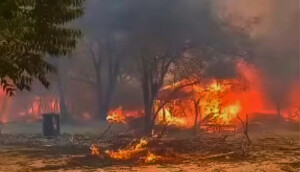ICC: Further witnesses testify against Darfur janjaweed leader Ali Kushayb today
The trial of former Darfur janjaweed leader, Ali Muhammad Ali Abdelrahman (known as ‘Ali Kushayb’), who has been accused of 31 counts of war crimes and crimes against humanity between 2003 and at least 2004, is scheduled to resume today International Criminal Court (ICC) in The Hague, the Netherlands.
 Darfur janjaweed leader Ali Muhammad Ali Abdelrahman (known as ‘Ali Kushayb’) on trial at the ICC in The Hague on 9 June 2022 (Photo: ICC)
Darfur janjaweed leader Ali Muhammad Ali Abdelrahman (known as ‘Ali Kushayb’) on trial at the ICC in The Hague on 9 June 2022 (Photo: ICC)
The trial of former Darfur janjaweed leader, Ali Muhammad Ali Abdelrahman (known as ‘Ali Kushayb’), who has been accused of 31 counts of war crimes and crimes against humanity between 2003 and at least 2004, is scheduled to resume today International Criminal Court (ICC) in The Hague, the Netherlands.
The witness for the 31st indictment (Witness P-0916) will testify about the alleged attacks carried out by armed rebel groups on Mukjar during the period from July and August 2003, and the campaigns launched during the month of February 2004, during which the males were arrested and detained in Mukjar from August to October 2003.
Kushayb and his militia are accused of attacking villages, including Kudoum and Bindisi, which resulted in the displacement of the civilians of these villages to Mukjar and the alleged detention, seizure and executions of villagers, including community leaders, in Mukjar in the period from February to March 2004.
Previous witnesses during the trial have given various examples of janjaweed atrocities in Darfur, in one case explaining how they “pillaged and burnt down villages”.
Background
*From the start of pre-trial proceedings, Ali Kushayb’s defence has always pivoted on ‘mistaken identity’, saying that he is not the person who perpetrated these crimes. However, on the opening day of the trial on Tuesday, senior trial lawyer for the prosecution, Julian Nicolls, told the court that the prosecution intends to present several witnesses (referred to only by a number for anonymity), who will testify that the accused is indeed Ali Kushayb, the feared so-called ‘Colonel of Colonels’.
Lead-up to trial
On November 2, 2021, The Appeals Chamber of the ICC unanimously rejected an appeal by Ali Kushayb, against the Pre-Trial Chamber II decision of 17 May 2021, rejecting a challenge of the court’s jurisdiction by Kushayb’s defence counsel.
The Appeals Chamber of the ICC, composed of Judge Piotr Hofmański, presiding in this appeal, Judge Luz del Carmen Ibáñez Carranza, Judge Perrin de Brichambaut, Judge Solomy Balungi Bossa, and Judge Gocha Lordkipanidze, decided unanimously to reject the appeal against the Pre-Trial Chamber II decision of 17 May 2021 on the Defence’s jurisdictional challenge (exception d’incompétence).
Presiding Judge Piotr Hofmański, in rejecting the Defence’s four grounds of appeal, the Appeals Chamber highlighted, among other matters, that it found no error in the reasons given by the Pre-Trial Chamber defining a “situation” before the Court as defined in terms of temporal, territorial and in some cases personal parameters. It also found that the non-funding by the United Nations of the activities of the Court arising from a referral by the Security Council does not invalidate the UNSC resolution 1593 which referred the situation to the ICC. As for the alleged failure of the Pre-Trial Chamber to consider the lack of the Security Council logistical and security support to the Court in Sudan, the Appeals Chamber finds that the Defence has not demonstrated how this alleged error of law relates to the jurisdiction of the Court.
Finally, and referring to the principle of legality, nullum crimen sine lege, the Appeals Chamber found that the referral of the Situation in Darfur, Sudan took place in the wake of serious violations of human rights and humanitarian law that were criminalised under international law at the time.
The Appeals Chamber also found that the crimes under the Statute were intended to be generally representative of the state of customary international law when the Statute was drafted. This weighs heavily in favour of the foreseeability of facing prosecution for such crimes even in relation to conduct occurring in a State not party to the Statute. Judge Ibáñez expressed her separate views concerning this ground of appeal and while agreeing with the outcome reached by the majority, she considered that, in her view, the jurisdiction of the Court over the conduct in this case pre-dates UNSC Resolution 1593, which only triggered the Court’s jurisdiction and thus there is no need to refer to any other sources of law.
Indictment
As previously reported by Radio Dabanga, Kushayb initially appeared before the ICC on June 15. He then appeared before Pre-Trial Chamber II on May 24-26 to hear submissions from the prosecution and legal representation of the victims.
The ICC issued arrest warrants against former Minister for Humanitarian Affairs, Ahmed Haroun, and Kushayb in 2007. Kushayb was transferred to the ICC’s custody on June 9, 2020 after surrendering himself voluntarily in the Central African Republic. Upon his arrest, the Sudanese government announced its support for his transfer to the ICC. Kushayb is also charged with a number of crimes by the Sudanese authorities.











 and then
and then